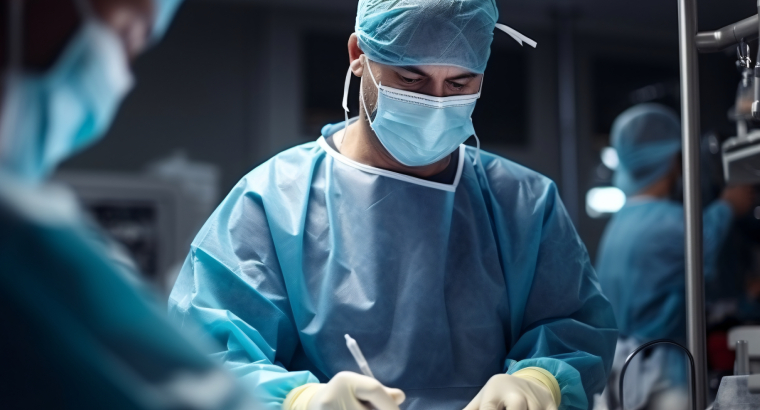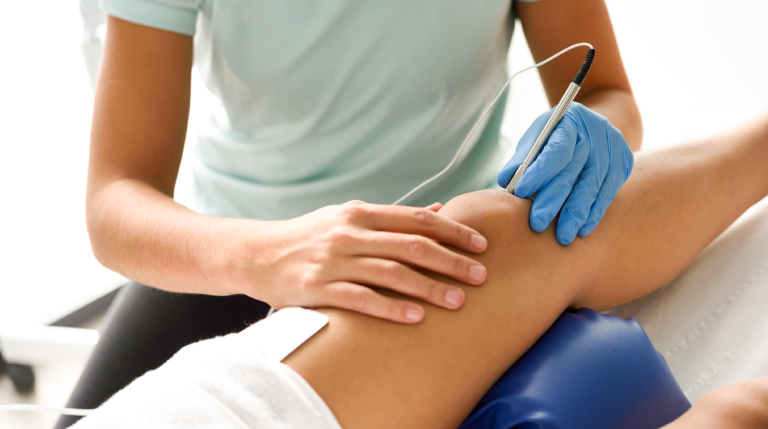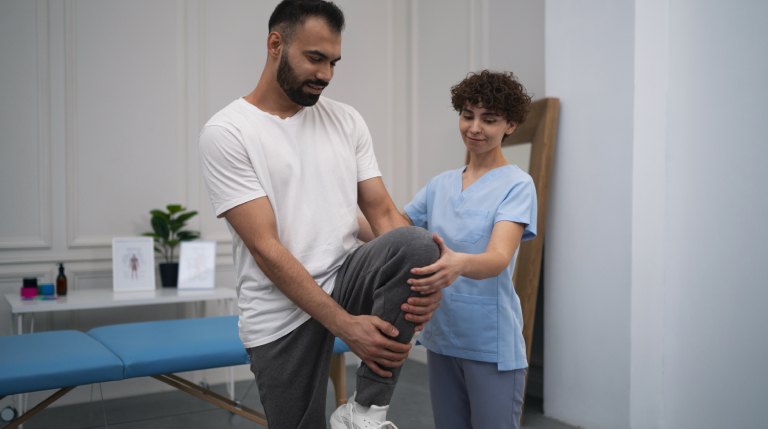
A Complete Guide to ACL Reconstruction Surgery and Post-Operative Care
Synopsis
ACL reconstruction surgery is a common procedure for those who have suffered from a severe ACL tear, typically resulting from sports injuries or accidents. In this blog, we delve into the details of ACL ligament reconstruction surgery, exploring the surgical process, recovery timeline, and post-surgery care essential for a successful outcome. We’ll also cover what to expect during torn ACL surgery and how the best orthopaedic surgeon for ACL reconstruction tailors treatment plans to meet each patient’s unique needs. Understanding post-ACL surgery care is critical, as it directly impacts recovery and long-term knee function. From choosing the right surgeon to managing your rehabilitation effectively, this guide will provide valuable insights for anyone considering ACL tear surgery. By the end of this blog, you’ll have a clear roadmap for your recovery and practical advice on preparing for and thriving after ACL reconstruction surgery.
Table of Contents
- Introduction to ACL Reconstruction Surgery
- Understanding Torn ACL Surgery- When Is Reconstruction Necessary?
- The Process of ACL Ligament Reconstruction Surgery
- Key Considerations When Choosing the Best Orthopedic Surgeon for ACL Reconstruction
- What to Expect Post ACL Surgery- Recovery Timeline and Care
- Managing Rehabilitation After ACL Tear Surgery
- Common Challenges and How to Overcome Them
- YKOrthopaedics- Experts in ACL Reconstruction and Post-Operative Care
Introduction to ACL Reconstruction Surgery
The Anterior Cruciate Ligament (ACL) plays a crucial role in stabilizing the knee, especially during activities that involve sudden stops, jumps, or changes in direction. When this ligament is partially or completely torn, ACL reconstruction surgery is often recommended to restore knee stability and function. This procedure is especially common among athletes but is also necessary for individuals who need a stable knee for everyday activities. ACL reconstruction surgery involves replacing the damaged ligament with a graft, typically taken from the patient’s tissue or donor. The goal is to rebuild the ligament and provide long-term stability to the knee, allowing patients to return to their previous activity levels.
Understanding Torn ACL Surgery- When Is Reconstruction Necessary?
Torn ACL surgery becomes necessary when the ligament is too damaged to heal naturally, leading to ongoing instability and risk of further injury. ACL reconstruction is generally recommended for patients with complete tears or for those whose partial tears do not respond well to conservative treatments like physical therapy. The decision to proceed with ACL ligament reconstruction surgery depends on several factors, including the patient’s age, activity level, and overall knee condition. For active individuals and athletes, delaying or avoiding surgery can lead to recurrent knee instability, cartilage damage, and early-onset arthritis. By addressing the tear through reconstruction, patients can regain their knee’s full functionality and reduce the risk of long-term complications.
The Process of ACL Ligament Reconstruction Surgery
ACL ligament reconstruction surgery is a minimally invasive procedure performed using arthroscopic techniques. The surgery begins with small incisions made around the knee, through which a camera and surgical instruments are inserted. The damaged ACL is removed, and a graft—either an autograft (taken from the patient’s hamstring or patellar tendon) or an allograft (donor tissue)—is used to reconstruct the ligament. The graft is positioned and secured in place using screws or other fixation devices. The procedure typically lasts 1-2 hours and is followed by a structured rehabilitation program. Successful ACL reconstruction surgery restores knee stability and allows patients to return to normal activities gradually.
Key Considerations When Choosing the Best Orthopedic Surgeon for ACL Reconstruction
Choosing the best orthopaedic surgeon for ACL reconstruction is crucial to successful outcomes. Factors to consider include:
- The surgeon’s experience
- Expertise in performing ACL ligament reconstruction surgery
- A history of positive patient outcomes
The best surgeons will tailor their approach to the patient’s specific needs, considering factors like age, activity level, and the nature of the injury. Additionally, a skilled surgeon will be well-versed in both the technical aspects of the surgery and the personalized care needed during the recovery phase. Ensuring that the surgeon is familiar with autograft and allograft techniques provides flexibility in choosing the best graft option for the patient.
What to Expect Post ACL Surgery- Recovery Timeline and Care
Post-ACL surgery care ensures a smooth recovery and prevents complications. The initial phase focuses on managing pain and swelling while protecting the new ligament. During the first few weeks, patients should expect to use crutches and wear a knee brace to stabilize the joint. Physical therapy begins early, typically within the first week, and focuses on regaining range of motion and preventing stiffness. As the healing progresses, the rehabilitation program shifts to strengthening the surrounding muscles and gradually restoring knee stability. Full recovery can take anywhere from 6-12 months, depending on the patient’s commitment to rehabilitation and the complexity of the surgery. Regular follow-up visits with the surgeon ensure that the recovery is on track and that any issues are addressed promptly.
Managing Rehabilitation After ACL Tear Surgery
Rehabilitation is a critical component of the recovery process following ACL tear surgery. The rehab program is usually divided into phases, each with specific goals and exercises tailored to the patient’s progress. In the early stages, the focus is reducing swelling, restoring range of motion, and initiating gentle strengthening exercises. As the recovery advances, more intensive exercises are introduced to rebuild strength, improve balance, and enhance joint stability. The final rehabilitation phase involves sport-specific or activity-specific training, allowing patients to safely return to their previous activity levels. A well-structured rehab plan, guided by a physical therapist, is key to achieving a successful outcome post-ACL surgery.
Common Challenges and How to Overcome Them
Recovering from ACL reconstruction surgery hasisn’t its challenges. Some patients may experience stiffness, difficulty regaining full range of motion, or ongoing knee pain. These challenges are usually manageable with consistent physical therapy and adherence to the rehabilitation plan. Another common concern is re-injury, especially if the patient returns to high-impact activities too soon. To minimize this risk, it’s important to follow the surgeon’s guidelines closely and not rush the recovery process. Working closely with your surgeon and physical therapist ensures that setbacks are addressed quickly, leading to a more successful recovery.
YKOrthopaedics- Experts in ACL Reconstruction and Post-Operative Care
At YKOrthopaedics, we provide top-tier ACL reconstruction surgery tailored to each patient’s needs. Our team of expert orthopaedic surgeons has extensive experience in ACL tear surgery and ACL ligament reconstruction, ensuring patients receive the best possible care. From the initial consultation to post-surgery follow-up, our focus is on personalized treatment plans that optimize recovery outcomes. Whether you require a straightforward reconstruction or more complex surgery, YKOrthopaedics offers the expertise, technology, and support needed for a smooth and successful recovery. With a commitment to patient care and advanced surgical techniques, we are the trusted choice for ACL surgery.
Conclusion- Trust YKOrthopaedics for Comprehensive ACL Surgery and Care
Choosing the right provider for ACL reconstruction surgery is key to achieving long-term knee stability and function. YKOrthopaedics combines cutting-edge technology with a patient-first approach to deliver exceptional care. Our surgeons are skilled in the latest ACL ligament reconstruction techniques and dedicated to guiding patients through every step of their recovery journey. Whether you’re dealing with a torn ACL or exploring your options for knee reconstruction, trust YKOrthopaedics to provide the expert care you need for a pain-free and active life.
FAQs
ACL tear surgery generally refers to any procedure aimed at repairing or reconstructing a torn anterior cruciate ligament (ACL). ACL reconstruction surgery involves replacing the torn ligament with a graft, usually from the patient’s tissue or a donor. ACL reconstruction aims to restore knee stability and function, making it suitable for patients with complete ligament tears or those experiencing knee instability. While ACL tear surgery may include simpler repairs for partial tears, ACL reconstruction surgery is typically performed when the ligament cannot be repaired directly and requires replacement.
Recovery from ACL ligament reconstruction surgery varies depending on the patient’s age, activity level, and commitment to rehabilitation. On average, full recovery can take 6-12 months. The initial phase focuses on controlling pain and swelling, regaining range of motion and beginning light exercises. Strengthening and stability exercises are gradually introduced as healing progresses, with more intensive rehabilitation in later stages. Athletes aiming to return to sports should expect a recovery period closer to 9-12 months. Consistent physical therapy and follow-up care with the best orthopaedic surgeon for ACL reconstruction are key to a successful recovery.
When selecting the best orthopaedic surgeon for ACL reconstruction, it’s essential to consider experience, specialization in ACL ligament reconstruction surgery, and the surgeon’s history of successful outcomes. Look for a surgeon who offers personalized care tailored to your specific needs, considering factors like your activity level, age, and the extent of the injury. It’s also important to choose a surgeon skilled in various graft techniques, such as autografts and allografts, ensuring you receive the most suitable treatment for your condition. Additionally, a good surgeon should be able to communicate the recovery process and provide comprehensive post-operative care.
Post-ACL surgery recovery involves a structured rehabilitation plan that progresses in phases. The first few weeks focus on managing pain, reducing swelling, and regaining range of motion. You’ll likely use you’ll and a knee brace for stability during this time. Physical therapy starts early to prevent stiffness and promote healing. As recovery continues, strengthening exercises are introduced to rebuild muscle and joint stability. The final phase of recovery focuses on returning to your previous activity level, whether dthat’saily tasks or sports. Consistent follow-ups with your surgeon ensure recovery stays on track and any complications are promptly addressed.
Torn ACL surgery, like any surgical procedure, comes with risks and potential complications. Common hazards include infection, blood clots, graft failure, and knee stiffness. Additionally, some patients may experience ongoing pain or instability, particularly if post-surgery rehabilitation is not followed properly. There is also a risk of re-injury, especially if the patient returns to high-impact activities too soon. Choosing an experienced orthopaedic surgeon and adhering closely to your rehabilitation plan can significantly reduce these risks. Early detection and management of complications are crucial for successful outcomes.




